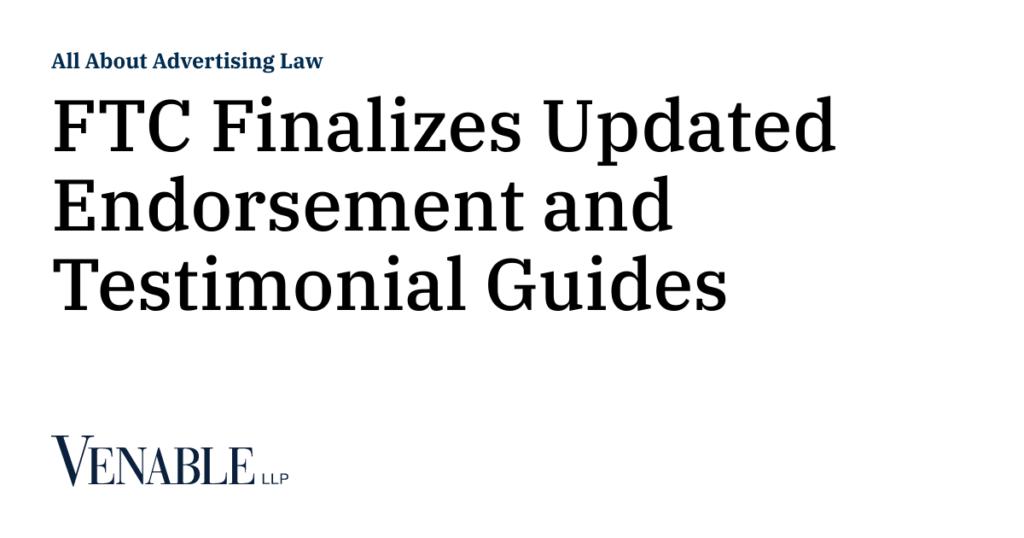FTC Finalizes Up to date Endorsement and Testimonial Guides

[ad_1]
13 months after proposing sweeping adjustments to its Endorsements and Testimonial Guides (Guides), the Federal Commerce Fee (FTC) has finalized its revised tips and launched an up to date set of FAQs to assist information the business with respect to the correct use of buyer evaluations, influencer advertising and marketing, and conventional endorsements and testimonials.
The brand new Information are over 80 pages. We are going to dive into particular sections in higher depth within the coming weeks, however listed below are some highlights:
- Expanded and clarified definition of “endorsements” and “endorsers.” The revised definitions state that “endorsements” may embody tags and “likes,” relying on the circumstances. Bots and nonexistent entities or individuals purporting to offer endorsements or evaluations are thought of endorsers.
- Materials connections. The Guides reiterate the FTC’s place that materials connections between endorser and advertiser needs to be disclosed however make clear {that a} “materials connection must be disclosed when a major minority of the viewers for an endorsement doesn’t perceive or anticipate the connection.” Per the FTC, sure well-known influencers could also be so carefully recognized with a selected model that nearly everybody is aware of of the connection. Moreover, followers of well-known influencers anticipate that they endorse merchandise solely when paid (however the FTC didn’t determine particular influencers becoming these descriptions). As an alternative, it states that whether or not any connection will not be anticipated by an viewers is a factual query that may require empirical testing.
- Disclosures. The Guides’ definition of “clear and conspicuous” aligns with the Fee’s steering in different areas, together with that a web-based disclosure needs to be “unavoidable.” If customers can view an endorsement however should click on a hyperlink labeled “extra” to see the disclosure, the FTC won’t think about this disclosure sufficiently clear and conspicuous. This steering may forecast adjustments for the FTC’s updates to its Dot Com Disclosures.
- Buying “likes.” The Guides state that it’s a misleading apply for advertisers to buy or create indicators of social media affect and misrepresent these in promoting.
- Legal responsibility of intermediaries. Part 255.1 now addresses intermediaries like promoting companies, public relations corporations, evaluate brokers, and status administration firms. The revisions state that such entities is perhaps liable for his or her roles in “creating” adverts containing endorsements that they know or ought to know are misleading.
- Altering the likeness or picture of endorser. The Guides state that an endorsement displaying the picture or likeness of an individual apart from the precise endorser is misleading if it misrepresents an attribute that may be materials to customers, e.g., an endorser’s complexion in an zits therapy advert.
- Reformulated merchandise. The revised Guides make clear that neither the advertiser not the endorser is required to take down or delete historic posts previous a product’s reformulation. Nonetheless, if an unique submit is shared or reposted after the product’s reformulation, the advertiser ought to verify that the reformulation doesn’t change the endorser’s views from the unique submit.
- Buyer evaluations. The revised Guides deal with the solicitation, use, and misuse of buyer evaluations. Apparently, the Guides have been issued at some point earlier than the FTC issued a Discover of Proposed Rulemaking Banning Faux Critiques and Testimonials. The Endorsement Guides state:
- The FTC considers it a deceptive apply for an advertiser to ahead solely favorable evaluations to a third-party web site or omit unfavorable evaluations.
- If an advertiser suppresses adverse evaluations on its web site, the FTC would think about the ensuing product pages deceptive. Nonetheless, the FTC clarified that it’s going to apply the Guides constantly with the Shopper Assessment Equity Act (CRFA), which states that sellers are usually not required to show buyer evaluations with illegal, harassing, abusive, obscene, vulgar, or sexually express content material; content material that’s inappropriate with respect to race, gender, sexuality, or ethnicity; evaluations that the vendor fairly believes are pretend; evaluations that “include[] the non-public info or likeness of one other particular person, or [are] libelous,” content material “that’s clearly false or deceptive,” or “commerce secrets and techniques or privileged or confidential industrial or monetary info.” The FTC said, nevertheless, {that a} vendor ought to apply its standards uniformly to all evaluations. The Fee additionally clarified its perception that customer support is said to a vendor’s merchandise when supplied by that vendor’s customer support division.
- The Guides embody a brand new instance addressing “evaluate gating,” or asking purchasers to offer suggestions however inviting solely these with constructive suggestions to submit on-line evaluations. The instance states that this “could also be unfair or misleading if it ends in the posted evaluations being considerably extra constructive than if the marketer had not engaged within the apply.” However the FTC clarified that nothing prohibits companies from asking completely happy clients for evaluations.
- Assessment websites. The Guides present that the FTC considers evaluate web sites misleading if they look like impartial when they aren’t. Equally, the FTC takes the place that paid rankings on evaluate websites are misleading even when the positioning discloses that rankings are impacted by fee. Nonetheless, if the evaluate web site will not be paid for greater rankings, and as a substitute receives commissions like affiliate referral charges, the positioning wouldn’t be misleading, so long as it adequately discloses this fee.
- Endorsements by staff. Employers can restrict legal responsibility for its staff’ undisclosed materials connections by taking steps to make sure compliance, together with appropriately coaching staff and monitoring endorsements. The Guides make clear that an employer needn’t monitor staff’ evaluations or endorsements until the employer solicits them, or in any other case has cause to find out about them.
- Endorsements directed to kids. New Part 255.6 states that endorsements in adverts directed to kids could also be of particular concern due to the character of the viewers. The FTC didn’t present further steering on disclosures in kids’s promoting, however notes that analysis suggests disclosures will not work for youthful kids. FTC workers not too long ago held a workshop to be taught extra about promoting to kids in digital media, together with endorsements directed to kids, and can seemingly subject extra steering.
Though the Guides wouldn’t have the power of legislation, they replicate the FTC’s place on endorsement practices which might be misleading. Practices inconsistent with the Guides may lead to actions by the FTC or a state legal professional basic alleging Part 5 violations. The proposed rule on evaluations may have the power of legislation if it turns into closing.
If you happen to assume it’s possible you’ll be affected by the adjustments made to the Guides, tell us how we may also help. Bookmark our All About Promoting Regulation weblog and subscribe to our month-to-month publication for extra updates.
[ad_2]
Source_link








